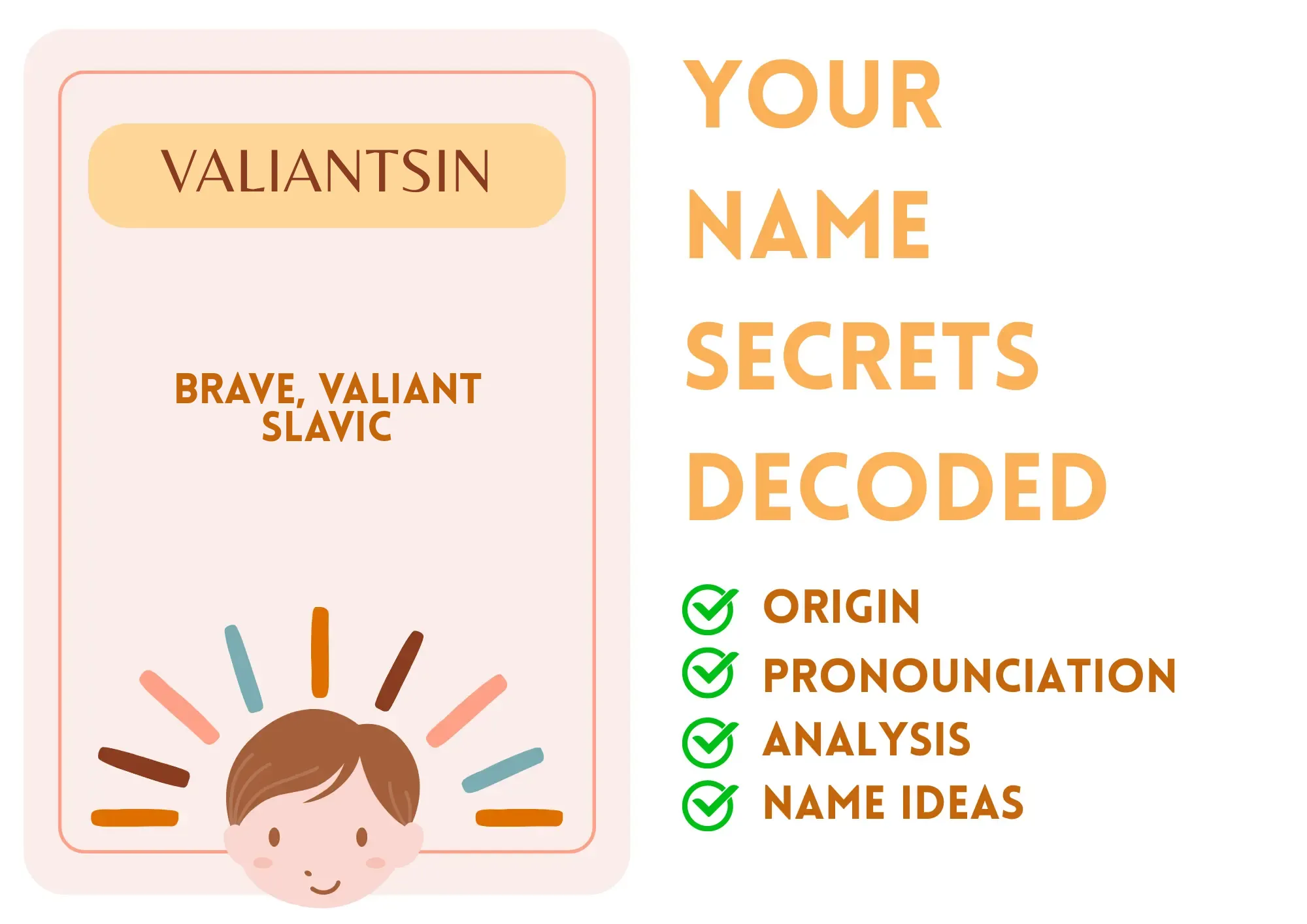
Valiantsin
Valiantsin is a distinctive baby name of Slavic origin, translating to 'brave' or 'valiant.' This name is predominantly male and is often associated with strength and courage.
Common in Belarus and surrounding Slavic regions, Valiantsin embodies virtues of bravery and heroism, often celebrated in folklore and traditional stories. It has historical narratives tied to legendary figures known for their valor and gallantry.
Valiantsin is viewed positively, evoking traits such as bravery, resilience, and noble spirit. The name is relatively easy to write and pronounce, making it approachable. Common nicknames include Val and Tian.
In popular culture, Valiantsin may not have mainstream recognition, but its roots in Slavic folklore and its empowering meaning contribute to its uniqueness and strong character. It is a revered choice among parents who value heritage and meaning in names.
Basic Information
Gender: Boy
Sounds Like: vah-lee-YAN-tsin
Pronunciation Explanation: The emphasis is primarily on the third syllable 'YAN', while the first syllable 'vah' is soft, and the last syllable 'tsin' is pronounced like 'seen' but with a 't' sound.
Summary and Meaning
Meaning: brave, valiant (Slavic)
Origin: Valiantsin has Slavic roots, with deep connections to Belarusian culture and language.
Usage: Valiantsin is traditionally a male name, commonly given to boys.
Name Number (Chaldean)
Name Number (Pythagorean)
Popularity (Global Rank)
Overall: 173455
Boys: 72681
Most Popular in
Religious and Cultural Significance
Religion: Orthodox
Background: In many Slavic countries, the name Valiantsin may have connections to Orthodox Christianity, which is prevalent in Belarus.
Cultural Significance: This name reflects cultural admiration for courage and heroism, prevalent in folklore and community narratives. Valiantsin is often seen as a legendary name associated with heroic deeds.
Historical Significance: Historically, characters named Valiantsin or similar variants have appeared in Slavic folklore, often depicted as knights or heroes undertaking noble quests and adventures.
Popular Culture
Literature and Mythology: While not widely seen in global literature, Valiantsin may appear in local tales that highlight bravery and heroism.
Movies and Television: The name may occasionally be used in films set in Slavic contexts, representing courageous characters or figures of folklore.
Feelings and Perceptions
Perception: Valiantsin is generally perceived as a strong and noble name, evoking feelings of bravery and strength. Many appreciate its unique sound and cultural roots.
Positive Feelings: Strong, courageous, unique, heroic, dignified.
Negative Feelings: Some may find it cumbersome or difficult to pronounce initially, leading to potential mispronunciations.
Practical Considerations
Ease of Writing and Calling: The name Valiantsin is moderately easy to write and pronounce. Its syllabic structure makes it memorable but may pose slight difficulty depending on the speaker's familiarity with Slavic names.
Common Typos and Misspellings: Valiatsin,Valyantsin,Valiantsen,Valliantsin
Common Nicknames: Val,Tian,Vanya
Valiantsin Popularity
Valiantsin Usage and Popularity By Country
| Country | Rank (Overall) |
|---|---|
| Belarus | 382 |
| Russia | 14046 |
| Poland | 16125 |
| Israel | 18593 |
| New Zealand | 33723 |
| Germany | 38475 |
| Singapore | 53638 |
| United States | 186323 |
Valiantsin Usage and Popularity By City
| City | Rank (Overall) |
|---|---|
| Brooklyn | 11278 |
| Minsk | 293 |
Compatibility Analysis
Famous Persons Named Valiantsin
-
-
-
-
Valiantsin Murawyow
Born: January 28, 1938 - Mishneva, Novasakolnitsky District, Pskov Oblast, Russia
university teacher | scientist
Related Names
Similar Sounding Names:
Valentin,Vladislav,Vitaliy,Viktor